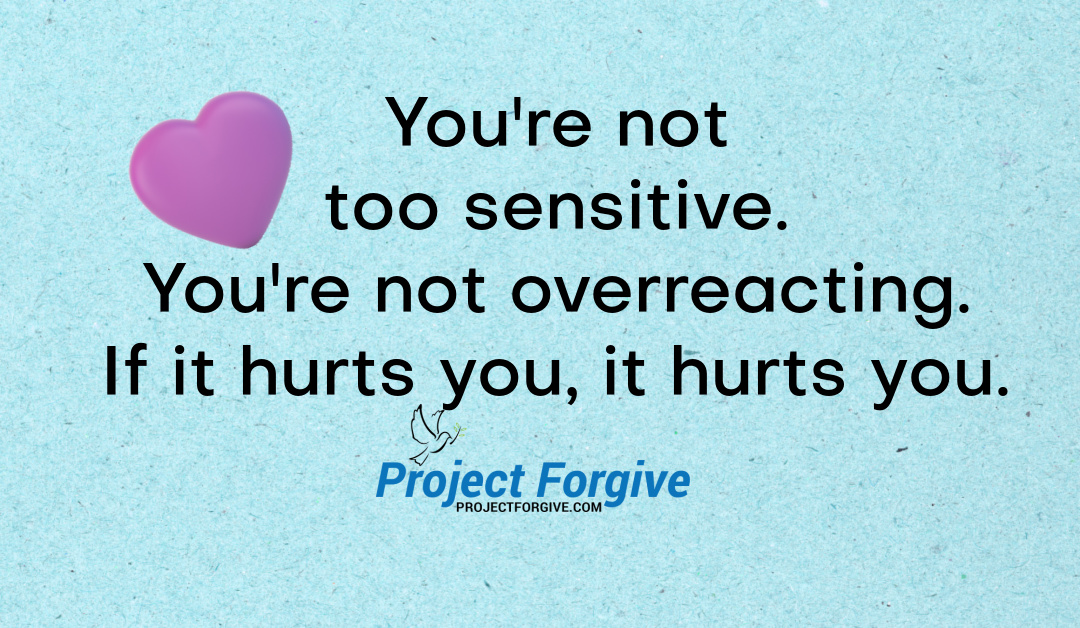“You’re too sensitive.”
How many times have you heard that one?
It usually happens when you call someone out on their behavior, you are setting a boundary, or you’re simply sharing how something has impacted you.
There are ways to build confidence and validate the strength of sensitivity. Below you’ll find some assertiveness techniques and ways to nurture your emotional intelligence.
Let’s start with the most common phrases sensitive people hear:
“You’re too sensitive.”
“I can’t say anything to you.”
“You’re so dramatic.”
“You make way too big of a deal out of things.”
“You can’t take a joke.”
“You’re overreacting.”
The reason these phrases hurt so much?
“Sensitive” people feel things strongly. Even though we feel things deeply, we may hide our emotions because we’ve learned to retreat. We’re also impacted by sound, light, music and can tap into other people’s emotions easily.
According to Tomkins’ Theory of 9 Affects, emotions are part of our biological hardwiring. We all have a personal script of how we understand and relate to emotions. We also experience emotions differently. There are many people who have no idea how others experience intense emotions. They can’t comprehend the depth of how things feel sometimes for sensitive people. Instead, they react to those deemed sensitive by thinking they are exaggerating, overreacting, or are simply dramatic.
It’s simply not true.
Research shows sensitive people tend to have increased awareness of subtleties in the environment and are easily overstimulated. Approximately 15-20 percent of the population is sensitive and there is a strong link between sensitivity and a person’s central nervous system. In essence, sensitive people perceive and process information more deeply.
While some of us are more sensitive than others, it’s really about having your emotions invalidated.
So how do you get your needs met and set a boundary for this type of “name-calling?”
Here are some communication suggestions to help you navigate with those who can’t grasp the depth of the emotions you’re feeling:
“Please don’t say that to me. Maybe I am sensitive, but when you say that and use that tone, I want to retreat from the relationship. My goal is to be close to you, not farther away.”
“It doesn’t feel good when you call me that. Please stop.”
“When you talk to me like that, it can mean I’ve hit a nerve. What’s going on with you?”

Here’s the thing … In a loving relationship, people work together to allow safety and vulnerability. If you find yourself repeatedly having to defend your sensitivity, you may want to consider a deeper dive into what may actually be going on in your relationship.
“You’re too sensitive,” can also have other meanings in disguise, such as:
“I don’t want to deal with you.”
“My feelings are more important than yours.”
“I don’t respect you.”
With that said, use your sensitivity to set boundaries and ask for what you want. Ignoring the comments or the underlying issues, won’t make them go away. Ignoring it never works. It just gets buried deeper for resentment to rear at a later and stressful time. Face it now.
Being sensitive is not a fault. Studies consistently show that people with high emotional intelligence make better leaders, friends and coworkers. We’re more self-aware, more empathetic, more motivated and have better social skills.
And for what’s it’s worth? Thank you for being so sensitive.
If inspired, please share.
Related Articles:
Knowing When to Let Go and When to Take Things Personally
Dropping Your “Armor” Takes Courage


